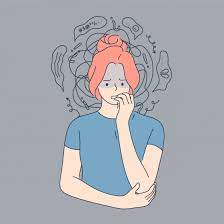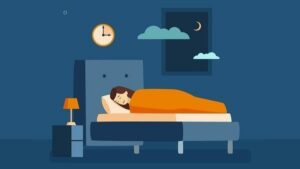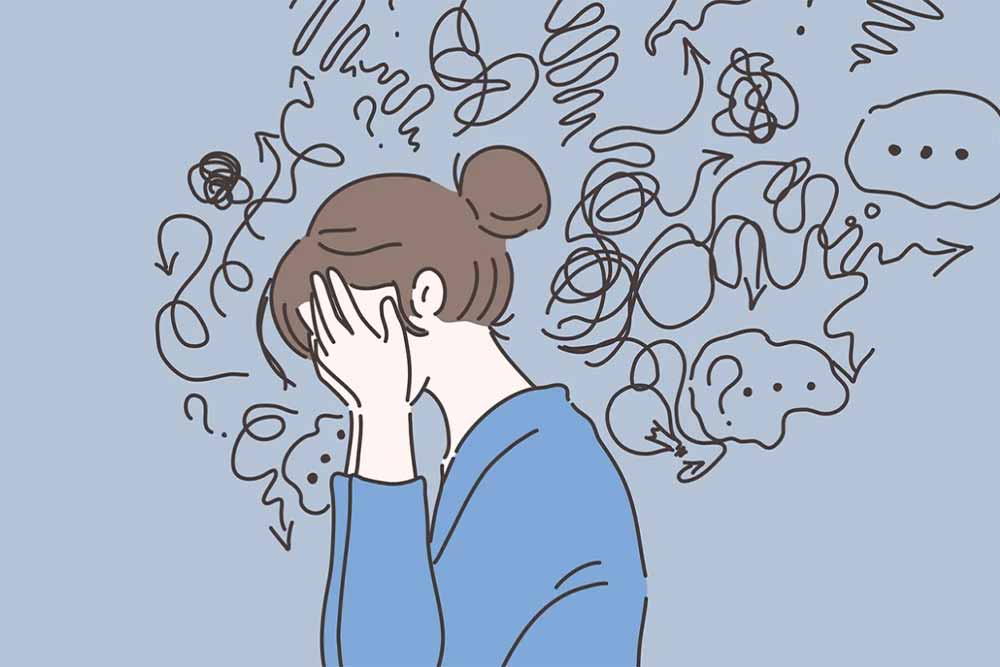Anxiety is one of the most common mental health disorders in the United States. It is estimated that 18% of adults suffer from anxiety disorders, making it one of the most prevalent psychiatric conditions. If you are one of the millions of people who suffer from anxiety, this article is for you! In this post, we will discuss 11 strategies for coping with anxiety.
Understanding Anxiety
 Before we discuss strategies for coping with anxiety, it is important to understand the condition of anxiety itself. Anxiety is a normal emotion characterized by feelings of fear, worry, and nervousness. It is your body’s way of responding to stress or a perceived threat.
Before we discuss strategies for coping with anxiety, it is important to understand the condition of anxiety itself. Anxiety is a normal emotion characterized by feelings of fear, worry, and nervousness. It is your body’s way of responding to stress or a perceived threat.
When you feel anxious, your body goes into fight-or-flight mode, which causes your heart rate to increase and your breathing to become shallow and rapid. This can make you feel like you’re not getting enough air. And eventually, it causes even more anxiety.
Anxiety becomes a problem when it is out of proportion to the situation or interferes with your daily life. For some people, anxiety can be so debilitating that it interferes with work, school, and relationships. Also, some common signs of anxiety that needs to be treated are when you:
- avoid things that trigger your anxiety
- think about anxious situations all the time
- can’t control your worry
- feel restless, irritable, and on edge
- have trouble sleeping or concentrating
If you have any of these symptoms, it is important to find some strategies for coping with anxiety that will work for you.
Strategies For Coping With Anxiety
There are many different strategies that can help you cope with anxiety. Some people find that one strategy works best, while others may need to try a few different ones before they find what works for them.
Here are 11 of the most common and effective strategies for coping with anxiety:
Learn about your condition
When you are planning to cope with anxiety, the first step is always to educate yourself about your condition. Learning about what causes your anxiety and how it affects your body can help you feel more in control of your symptoms. In fact, one study found that people who took an educational course on their anxiety disorder felt more in control of their symptoms than those who didn’t.
Moreover, when you know more about your anxiety, you can be better prepared to deal with it. For example, if you know that your anxiety is triggered by public speaking, you can start to work on some specific strategies to help you cope with that situation.
Exercise
Exercise is a great way to release tension and stress, and it can also help to clear your mind. Taking a brisk walk, going for a run, or even just doing some simple stretches can help to reduce your anxiety. In fact, practicing exercise is believed to be one of the best ways to prevent anxiety from developing in the first place.
Moreover, research has shown that people who exercise regularly are less likely to experience anxiety than those who don’t. Because exercise releases endorphins, it can also help to improve your mood and give you a sense of well-being. So, make it your daily habit, though only for 10-15 minutes. But try it!
Talk to someone you trust
It can be really helpful to talk to someone about your anxiety – whether that’s a friend, family member, therapist, or counselor. Talking openly about what you’re experiencing can help you feel less alone and more in control. In fact, sharing your feelings with your loved ones is a great way to make your heart light. And it also helps to have someone to vent to when you’re feeling overwhelmed.
If you don’t feel comfortable talking to people in your life about your anxiety, that’s OK, too. There are plenty of other outlets for you to explore. You can join a support group or an online forum where you can chat with other people who are dealing with similar issues.
Read self-help books and blogs
There are many self-help books and blogs available on the internet that can help you cope with anxiety. You can find helpful tips and techniques to manage your anxiety. Also, in this day and age, there are many online communities that can provide support and advice. More often, blogs are personal accounts of someone’s experience with anxiety, which can be very relatable and helpful.
For instance, if one blogger will be open about their struggles and what works for them. Then, it can give you a better idea of what to expect and how to cope. So, reading books and blogs can always have a greater impact than googling your symptoms.
Identify your triggers
 Anxiety doesn’t just appear out of nowhere – it’s usually triggered by something. It could be a specific situation, like public speaking, or it could be more general, like stress at work. Once you know what your triggers are, you can start to develop a plan for how to deal with them.
Anxiety doesn’t just appear out of nowhere – it’s usually triggered by something. It could be a specific situation, like public speaking, or it could be more general, like stress at work. Once you know what your triggers are, you can start to develop a plan for how to deal with them.
Avoiding your triggers is usually not an option – but that doesn’t mean you have to face them alone. Talk to a friend or family member about what you’re going through, and ask them to be there with you when you face your fear.
Meditation
This is often the first thing people think of when they hear the word “anxiety”. And there’s a reason for that – it works. Meditation has been shown to be an effective way to reduce anxiety. It helps by teaching you how to focus and control your thoughts, which is helpful when you’re feeling anxious.
There are a lot of different ways to meditate, so you can find one that works for you. Some of these techniques include:
- Breathing exercises
- Guided meditation
- Progressive muscle relaxation
- Mindfulness meditation
If you’re not sure how to get started, there are plenty of resources available online or you can even download a meditation app. Once you find a method that works for you, stick with it and make it part of your daily routine.
Eat healthy diet
It is very important to eat a healthy diet when you are dealing with anxiety. A healthy diet will help your body to be strong and cope with the anxiety better. There are certain foods that can help to reduce anxiety, such as:
- Omega-three fatty acids: These can be found in fish, flax seeds, and chia seeds.
- Vitamin B: This can be found in dark leafy greens, legumes, and nuts.
- Magnesium: This can be found in dark chocolate, pumpkin seeds, and spinach.
Try to incorporate these foods into your diet as much as possible. Because they will help your body to be strong and cope with anxiety better. Moreover, a healthy diet is always good for your overall health.
Get enough sleep
 Sleep is a basic human need and it’s also very important for your mental health. When you don’t get enough sleep, it can aggravate anxiety and make it harder to cope with. Make sure to get at least eight hours of sleep every night. As studies have also claimed that sleep deprivation is linked with an increased risk of developing anxiety disorders. So, here are some ways you can enhance your sleep hours, these include:
Sleep is a basic human need and it’s also very important for your mental health. When you don’t get enough sleep, it can aggravate anxiety and make it harder to cope with. Make sure to get at least eight hours of sleep every night. As studies have also claimed that sleep deprivation is linked with an increased risk of developing anxiety disorders. So, here are some ways you can enhance your sleep hours, these include:
- Establishing a regular sleep schedule
- Limit your screen time before going to bed
- Keeping your bedroom cool, dark, and quiet
By following these tips, you can get the most out of your sleep and hopefully minimize anxiety.
Avoid alcohol and drugs
Some people self-medicate with alcohol or drugs when they’re feeling anxious, but this will only make things worse in the long run. Alcohol and drugs are depressants, which means they can actually increase anxiety levels. In fact, alcohol is one of the most common triggers for anxiety attacks. And some people feel like they need to have a drink or smoke weed in order to calm down.
But all it does is make anxiety worse. In fact, it can even lead to addiction and make your anxiety worse in the long run. So if you’re struggling with anxiety and find ways to cope with anxiety. Then, it’s important to stay away from alcohol and drugs.
Keep a journal
Journals are of great help when you’re feeling anxious. It allows you to get all of your thoughts and feelings out without having to worry about anyone else’s judgment. You can write as much or as little as you want, and there are no rules. Just let it all out. There are numerous ways to keep a journal, so find one that works best for you.
You can try stream of consciousness writing, which is when you just write whatever comes to mind without pausing. This can be helpful because it can help you to identify any patterns in your thinking.
Another option is to keep a gratitude journal. Write down things that you’re grateful for each day. This can help shift your focus from negative to positive thoughts. Also, understand coping with anxiety is difficult and takes time.
Distract yourself and stay busy
 This can be a way to cope with anxiety by keeping yourself occupied so that your mind does not have time to focus on anxious thoughts. Find an activity that you can immerse yourself in and that takes your mind off of worry. This could be a creative outlet like:
This can be a way to cope with anxiety by keeping yourself occupied so that your mind does not have time to focus on anxious thoughts. Find an activity that you can immerse yourself in and that takes your mind off of worry. This could be a creative outlet like:
- painting or writing
- working on a challenging puzzle
- playing an instrument
Physical activity can also be a great distraction from anxiety. For example:
- taking a brisk walk outside
- going for a run
- spending time in nature
So, these are all things you can use to distract yourself when you’re feeling anxious. In fact, you might want to come up with a list of activities that you can do so that when anxiety strikes, you have something to turn to.
Conclusion
Conclusively, coping with anxiety is a difficult but not impossible feat. It requires seeking help, understanding your triggers, and making lifestyle changes. The most important part is to be patient with yourself and remember that progress takes time. This condition is highly treatable, so don’t hesitate to reach out for help if you need it. Also, don’t forget to celebrate the small victories along the way.
However, if you find that your anxiety is starting to interfere with your daily life, it might be time to seek professional help. A therapist can help you understand and manage your anxiety in a more holistic way.
For more information, please contact MantraCare. Anxiety is a common mental health condition characterized by persistent feelings of worry, fear, and apprehension. If you have any queries regarding Online Anxiety Counseling experienced therapists at MantraCare can help: Book a trial Anxiety therapy session


